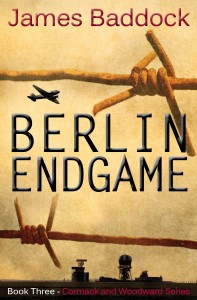 Now that the books are now available online, it might be an idea for me to say something about them – how they came to be written, what inspired them, etc, so I’m starting with the lead book in this project, Berlin Endgame. It’s been selected as the priority launch because (a) it hasn’t been previously published and (b) it ties in with two that have: The Dutch Caper (or The Radar Job) and Emerald, which both feature the same two main characters, Alan Cormack and Tony Woodward.
Now that the books are now available online, it might be an idea for me to say something about them – how they came to be written, what inspired them, etc, so I’m starting with the lead book in this project, Berlin Endgame. It’s been selected as the priority launch because (a) it hasn’t been previously published and (b) it ties in with two that have: The Dutch Caper (or The Radar Job) and Emerald, which both feature the same two main characters, Alan Cormack and Tony Woodward.
Originally titled Carronade, this is the third book in the series, set during the Berlin Blockade in 1948. The basic idea had been at the back of my mind since finishing Emerald, but I had other projects to finish first that had more substance to them; at this stage, all I had was the notion of putting Cormack and Woodward into Berlin during the Blockade, but with no more detail than that.
Once I started carrying out research into the Berlin Airlift, however, I realised just how much of a crisis situation it had been; there had been a very real threat of an armed confrontation in the city that might well have escalated into all-out war between the Soviet Union and the Western Allies. Maintaining the Trizone (which later became known as West Berlin) was seen as being a vital political priority for the West, the argument being that if Berlin were to be handed over to the USSR, then would West Germany be defended if the Soviets decided to move westwards? Hence the Airlift; the Trizone had to be protected, come what may. It was with this political knife edge in mind that I started putting the book together. ‘Carronade’ was the codename of the undercover operation that Cormack has to uncover (and still is, actually), but the original title was part of a vague idea of mine to have a series of books all named after historical weapons with unusual names – Carronade, Arquebus, Culverin, Trebuchet, etc – but I scrapped that approach fairly quickly, although I retained the Carronade title for a while. Eventually, I realised that readers would probably be expecting a novel about naval warfare in the 18th century from a book with that name and so revised it to something more potentially apocalyptic.
I began planning out the storyline, starting with the main thread – what exactly is Operation Carronade? It needed to be something that would have a profound effect on the situation in Berlin and then thought had to be given as to how Cormack would uncover it. There would have to be a change in role for Cormack – instead of being the undercover agent sent behind enemy lines, he would now have to be the investigator, gradually peeling away the levels of secrecy surrounding the plot. That was relatively easily done on the basis of Cormack being recruited back into Intelligence work as a thief to catch a thief; he had worked undercover and so knew all the dodges. Therefore, he could be assigned a post in Army Counter-Intelligence in Berlin (having already filled a similar position in Hamburg). Woodward, now a civilian pilot, would be involved in the Airlift itself and so the two could meet up again.
Unlike the previous books in the series, the two of them are not constantly trying to evade capture (or at least not in the first part of the book, anyway). This meant that I could take more time about putting in background information, both about life in Berlin, but also into their back stories – the reader finds out more about Cormack’s past and motivations than in the first two books put together; he is also shown as being at his most vulnerable. I could also explore the bond between Cormack and Woodward much more thoroughly this time, because there is far more focus on them overall; about 95% of the book is seen from their viewpoint, unlike The Dutch Caper or Emerald, where a fair proportion of the story is seen through the eyes of other characters.
The ending of the book is something of a cliffhanger, leaving a distinct possibility of a sequel – there are still a number of loose ends, one way or another – but the central story of Endgame has been resolved and so it stands up as a standalone work. (I’ve tried to make this a feature of the Cormack and Woodward series – each book tells its own story, so you don’t need to have read the previous one(s) in order to understand what’s going on.) Having said that, ideas for a follow-up to Berlin Endgame are already churning around… Watch this space!